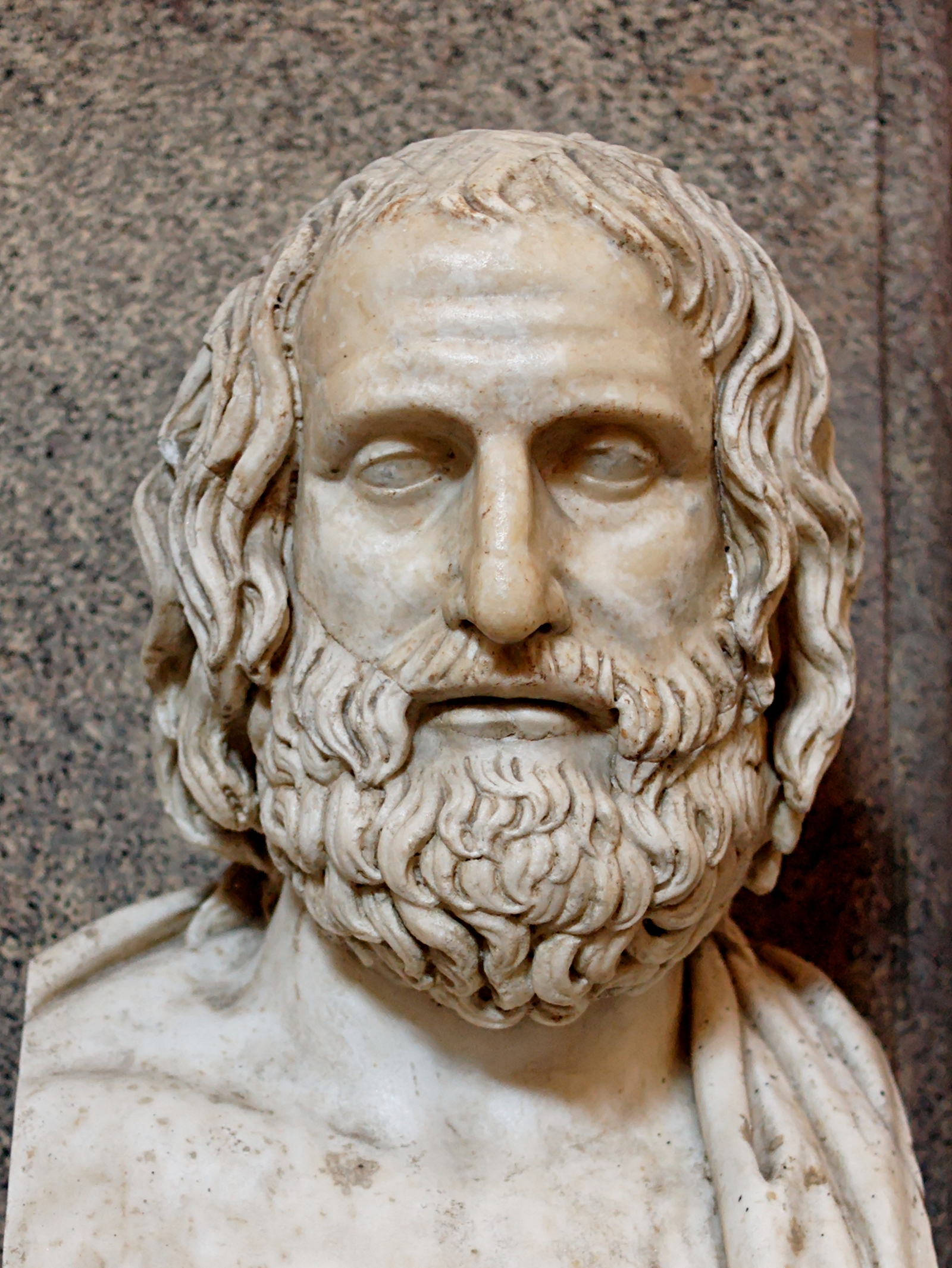Еврипид знаменитые цитаты
Еврипид Цитаты о мужчинах
Еврипид Цитаты о жизни
Еврипид цитаты
„Ипполит Ой, смотри, Здоров ли ум, коли корона манит.“
ум
Источник: Медея. Ипполит. Вакханки (сборник)
Еврипид: Цитаты на английском языке
“Those whom the gods wish to destroy they first make mad.”
Anonymous ancient proverb, wrongly attributed to Euripides. The version here is quoted as a "heathen proverb" in Daniel, a Model for Young Men (1854) by William Anderson Scott. The origin of the misattribution to Euripides is unknown. Several variants are quoted in ancient texts, as follows.
Variants and derived paraphrases:
For cunningly of old
was the celebrated saying revealed:
evil sometimes seems good
to a man whose mind
a god leads to destruction.
Sophocles, Antigone 620-3, a play pre-dating any of Euripides' surviving plays. An ancient commentary explains the passage as a paraphrase of the following, from another, earlier poet.
When a god plans harm against a man,
he first damages the mind of the man he is plotting against.
Quoted in the scholia vetera to Sophocles' Antigone 620ff., without attribution. The meter (iambic trimeter) suggests that the source of the quotation is a tragic play.
For whenever the anger of divine spirits harms someone,
it first does this: it steals away his mind
and good sense, and turns his thought to foolishness,
so that he should know nothing of his mistakes.
Attributed to "some of the old poets" by Lycurgus of Athens in his Oratio In Leocratem [Oration Against Leocrates], section 92. Again, the meter suggests that the source is a tragic play. These lines are misattributed to the much earlier semi-mythical statesman Lycurgus of Sparta in a footnote of recent editions of Bartlett's Familiar Quotations and other works.
The gods do nothing until they have blinded the minds of the wicked.
Variant in 'Dictionary of Quotations (Classical) (1906), compiled by Thomas Benfield Harbottle, p. 433.
Whom Fortune wishes to destroy she first makes mad.
Publilius Syrus, Maxim 911
The devil when he purports any evil against man, first perverts his mind.
As quoted by Athenagoras of Athens [citation needed]
quem Iuppiter vult perdere, dementat prius.
"Whom Jupiter wishes to destroy, he first sends mad"; neo-Latin version. Similar wording is found in James Duport's Homeri Gnomologia (1660), p. 234. "A maxim of obscure origin which may have been invented in Cambridge about 1640" -- Taylor, The Proverb (1931). Probably a variant of the line "He whom the gods love dies young", derived from Menander's play The Double Deceiver via Plautus (Bacchides 816-7).
quem (or quos) Deus perdere vult, dementat prius.
Whom God wishes to destroy, he first sends mad.
Whom the gods would destroy, they first make mad.
This variant is spoken by Prometheus, in The Masque of Pandora (1875) by Henry Wadsworth Longfellow
Those whom the gods would destroy, they first make mad.
As quoted in George Fox Interpreted: The Religion, Revelations, Motives and Mission of George Fox (1881) by Thomas Ellwood Longshore, p. 154
Those whom God wishes to destroy, he first makes mad.
As quoted in Bartlett's Familiar Quotations 16th edition (1992)
Nor do the gods appear in warrior's armour clad
To strike them down with sword and spear
Those whom they would destroy
They first make mad.
Bhartṛhari, 7th c. AD; as quoted in John Brough,Poems from the Sanskrit, (1968), p, 67
vināśakāle viparītabuddhiḥ
Sanskrit Saying (also in Jatak katha): "When a man is to be destroyed, his intelligence becomes self-destructive."
Modern derivatives:
The proverb's meaning is changed in many English versions from the 20th and 21st centuries that start with the proverb's first half (through "they") and then end with a phrase that replaces "first make mad" or "make mad." Such versions can be found at Internet search engines by using either of the two keyword phrases that are on Page 2 and Page 4 of the webpage " Pick any Wrong Card http://www.bu.edu/av/celop2/not_ESL/pick_any_wrong_card.pdf." The rest of that webpage is frameworks that induce a reader to compose new variations on this proverb.
Misattributed
“Arm yourself, my heart: the thing that you must do is fearful, yet inevitable.”
Источник: Medea and Other Plays: Medea / Alcestis / The Children of Heracles / Hippolytus
“Do not mistake the rule of force
for true power. Men are not shaped by force.”
Источник: The Bacchae
“No one can confidently say that he will still be living tomorrow.”
Источник: Alcestis (438 BC), l. 783-4
“There is in the worst of fortune the best of chances for a happy change.”
Iphigenia in Tauris (c. 412 BC) l. 721
“Authority is never without hate.”
Ion (c. 421-408 BC) as translated by Ronald F. Willetts
“Silence is an answer in the eyes of the wise.”
Unidentified Plays, Fragment 977
Variant translation: Silence is true wisdom's best reply. (See Discussion page for sourcing information)
“In this world second thoughts, it seems, are best.”
Variant translations: Among mortals second thoughts are the wisest.
Second thoughts are ever wiser.
Among mortals second thoughts are wisest.
Источник: Hippolytus (428 BC), l. 435, as translated by David Grene
